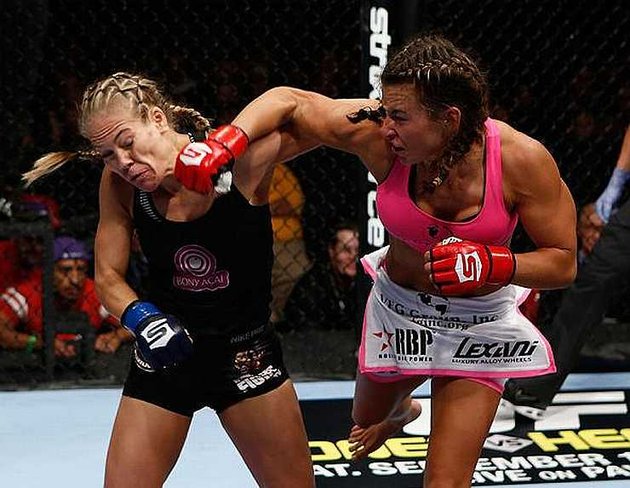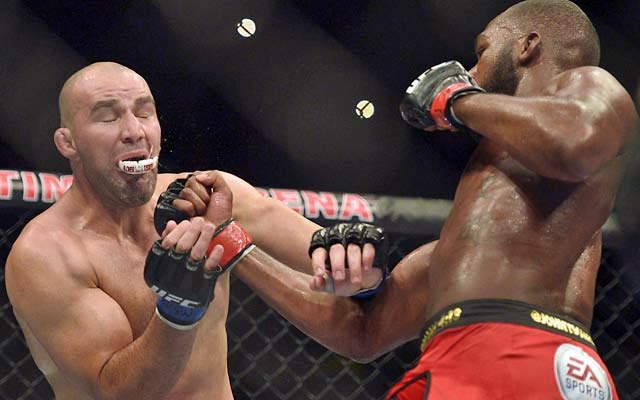We’ve all heard the phrases before, and even joined in the battles ourselves: “There’s no way
Certain qualifications should be met by any individual before he or she is placed within Top Five or Top Ten rankings. Champions such as Georges St. Pierre, Anderson Silva and Frankie Edgar all deserve their places at the top of their respective divisions’ rankings. However, that raises the first major question we need to consider: If an individual is a UFC champion, does that automatically mean he should be ranked number one in his division?
Before their bout at UFC 136, some media outlets had Gray Maynard listed above the lightweight champion Edgar on their rankings due to Maynard’s win over Edgar back in 2008. Some individuals, including myself, didn’t agree with the ranking, however I see the logic behind it. Even though Edgar was the champion, Maynard held a win over him, and the rankings should have reflected that information. And while this situation doesn’t happen often, it’s puts an interesting wrinkle into what is an already complex process.
The next question that should be considered is how the type of victories that compose each fighter’s resume affect an individual’s placement on the rankings. In basic terms, MMA victories can be broken down into three groups: knockouts, decisions or submissions. Should a fighter that has mostly knockout victories be ranked over a fighter who usually wins by decision? Personally, I’ve always believed that a win is a win, but as MMA continues to change, so too do the rules that govern it. As fans clamour for more “exciting finishes,” (which is usually translated as “knockouts”) the fighters who deliver them are normally pushed up the promotional ladder more quickly.
Dan Hardy is a recent recipient of this type of treatment. During his four-fight push towards a welterweight title shot, Hardy became known for being willing to stand and exchange with every fighter in his way. While his resume of victories over Mike Swick, Marcus Davis, Rory Markham and Akihiro Gono could be questioned, it doesn’t change the fact that he was granted a title shot against St. Pierre at UFC 111. However, after being dominated in defeat, Hardy has suffered three additional losses in the Octagon, and his future within the organization could be in doubt.
What role does a fighter’s overall resume play in where he or she is ranked within a particular division? Fedor Emelienako was widely considered the best heavyweight fighter in the world for an extended period of time. Recently, however, fans began to question that title, and attacked the worth of his wins from years before. Many fighters he has wins over, such as Tim Sylvia and Andrei Arlovski, have gone through rough patches that have devalued the worth of those wins. Sometimes when looking at a fighter’s resume it’s almost too easy to discredit important wins on his or her list…especially when making the argument for another fighter. The same practice goes on, albeit subconsciously, when one attempts to create a set of rankings that encompasses an entire division.
While we may never truly agree on a system to rank all the fighters who test themselves within cages and rings, the ability of fans to debate the nature of rankings methodologies, or even their worth, adds an interesting aspect to their enjoyment of the sport of mixed martial arts. Besides, any rankings system is a much better system than fighters merely being considered “in the mix.”





We, MMA Ratings, had Maynard over Edgar for exactly the reason you mentioned. Furthermore we still have Dos Santos over Velasquez based on strength of opposition.
This "strength of opposition" should be the primary consideration when it comes to rankings. "Promotional ladders" should have nothing to do with rankings and neither should promotional titles. They are both arbitrary, and while opposition can be guided, strength of opposition is the best measure of a fighter's ranking.
Regarding types of victories, I don't believe they should be evaluated based on types of finishes, but in degrees of domination, which is obviously subjective, but I believe there is *usually* sufficient consensus. That said degrees of domination is relative to opposition, and therefore should be considered a secondary criteria to strength of opposition.
I have to disagree with your comparison of rankings and fighters being considered "in the mix" by promotions. While it may have become fashionable to mock the "in the mix" classification, it serves a purpose for promotions whose goal is not to rank fighters, but to put on compelling fights. Consider the amount of injuries and other dynamics that may sideline a fighter and prevent putting on the bouts we want to see. Now imagine of the promotion was held to some standard based on an official set of rankings. It would be counter productive for a promotion to promote the idea. Promotions are better served by categorizing fighters as possible contenders, or "in the mix."